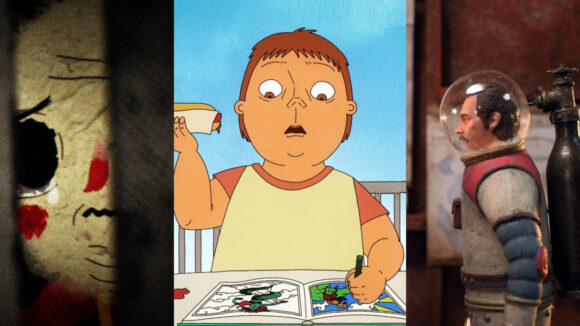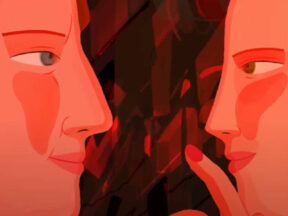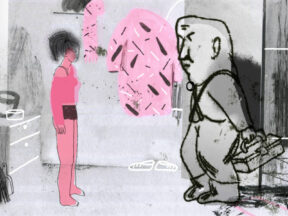

10 Can’t-Miss Short Films That’ll Screen At Ottawa 2023
We’re just over a week away from this year’s Ottawa International Animation Festival and growing more enthusiastic by the day.
This year, the festival received 2165 submissions from 85 countries. In the end, 40 were picked to participate in the 2023 main shorts competition. We watched them all and have selected 10 films that attendees should be sure to check out.
Ottawa will take place in Canada’s capital city from September 20-24. For more information, visit animationfestival.ca.
27, Flóra Anna Buda (France, Hungary)
- This isn’t the first time we’ve recommended 27, which already beat out all the live-action competition at Cannes to win the short film Palme d’Or and took the top prize at Annecy this year. 27 is Buda’s second short; her debut Entropia was a revelation in 2019, winning awards at GLAS and the Berlinale. In 27, Alice is celebrating her 27th birthday. An adult by almost any measure, she is suffocating a bit as she still lives with her parents and nosey younger brother. Feeling stuck, she regularly disappears into her dreams to escape her dreary everyday life. After a psychedelic party on a factory roof – featuring a visual feat of colors, shapes, and movement – Alice is involved in a serious drunken bike accident. But will a brush with death be enough for her to take control of her life?
Antipolis, Kaspar Jancis (Estonia)
- In this playful stop-motion short, some people believe that the Earth is flat while others believe that another civilization lives under the Earth’s crust. Scientists, politicians, and miners all have their own closely held opinions on the matter and refuse any evidence to the contrary. Sounds familiar, huh? The short’s dark humor is enhanced by well-designed puppets and backgrounds that feel real enough to hit home the film’s relatable narrative.
The Miracle, Nienke Deutz (Belgium, Netherlands, France)
- Nienke Deutz made a big splash on the festival circuit with her 2018 short Bloeistraat 11, which won won the Annecy Cristal for best animated short, among other honors. This time, as she did with her first film, Deutz pits translucent characters in front of vibrant hand-built backgrounds, mixing 2d and stop-motion techniques. This time, she tells the story of a single woman at a luxury resort where all the most enjoyable activities are reserved for couples and families.
World to Roam, Stephen Irwin (U.K.)
- Irwin is a familiar face here at Cartoon Brew, and his latest film is as dark and disturbing as anything we’ve seen from him in the past. This time, Irwin tells the story of a nuclear family and how the infant child perceives its parents. The narrative is tender, but the execution stands in stark contrast with a grainy, dark filter and almost morbid character designs latching on to the audience and instilling a sense of dread and anxiety that doesn’t let up.
Oneluv, Varya Yakovleva (Russia)
- Yakovleva is a relative newcomer, but her debut short, Oneluv, is already impacting the festival circuit after winning the top prize at Animafest Zagreb. In the film, strangers visit a young couple’s home. Taking advantage of the hosts’ hospitality, the unexpected guests push the couple to do rash things, which destroys the established order and harmony within the family. The scribbly animation adds to the discomfort of the film’s narrative and becomes more frantic as the situation gets more out of hand.
Electra, Daria Kascheeva (Czech Republic, France, Slovakia)
- Electra has loads of buzz coming off competition screenings at Cannes and Annecy and an upcoming competition screening in Toronto. The short is told from the first-person perspective of its titular protagonist, who looks back on her 10th birthday. Her memories become intertwined with dreams and imagination, represented in the film’s off-kilter stop-motion animation. Complicated parental relationships are alluded to, and while Electra may be an unreliable narrator regarding the facts of her youth, there is no doubt that her pain is authentic.
Eeva, Morten Tšinakov, Lucija Mrzljak (Estonia, Croatia)
- Eeva premiered at Tallinn Black Nights in November last year and has featured at numerous major festivals and events since, winning prizes at Zagreb and Annecy. The 2d dark comedy takes place at a rainy funeral where its titular protagonist endures the saddest day of her life after suddenly becoming a widow. A drab color palette, simple, grim character designs, and relatable facial expressions help to enhance the film’s morose sense of humor.
A Crab in the Pool, Alexandra Myotte, Jean-Sébastien Hamel (Canada)
- Sure to be one of the hometown favorites at this year’s festival, A Crab in the Pool is a coming-of-age story all about family. Zoe and her little brother Theo are left to fend for themselves in a run-down neighborhood. Like most younger siblings do, Theo looks up to Zoe, but like most older siblings, she just wants him out of her business. The animation is just weird enough to be a lot of fun without adversely affecting the grounded story of two siblings
Miserable Miracle, Ryo Orikasa (France, Canada, Japan)
- Another hometown title, this short is an animated adaptation of the book Misérable Miracle by Henri Michaux (1956), written about his experiences with mescaline. The book’s lines of text fill the screen and begin to vibrate and morph, with individual letters breaking off and turning to stick figures as a narrator reads the author’s original words.
Ikimono-san: Turtle, Atsushi Wada (Japan)
- Originally developed as a video game, this short – one of a series – marks the first time celebrated filmmaker Atsushi Wada works in television animation. Each part of the series tracks the enigmatic daily activities of a boy named Bōzu and his dog Inu as they interact with other living creatures, “ikimono” in Japanese, around them. The animation, music, and sound design are simple and playful, perfectly reflecting the innocent nature of the short’s protagonists.

.png)

